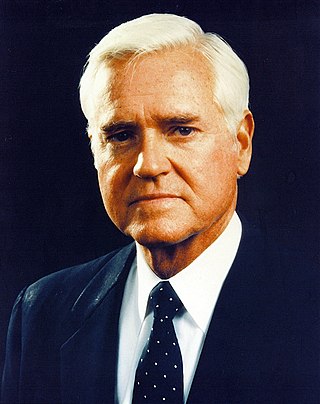
Ernest Frederick "Fritz" Hollings was an American politician who served as a United States senator from South Carolina from 1966 to 2005. A conservative Democrat, he was also the 106th governor of South Carolina, the 77th lieutenant governor of South Carolina, and a member of the South Carolina House of Representatives. He served alongside Democrat-turned-Republican Senator Strom Thurmond for 36 years, making them the longest-serving duo in U.S. Senate history. At the time of his death, he was the oldest living former U.S. senator.

The 1998 United States Senate elections were held on November 3, with the 34 seats of Class 3 contested in regular elections. This was seen as an even contest between the Republican Party and Democratic Party. While the Democrats had to defend more seats up for election, Republican attacks on the morality of President Bill Clinton failed to connect with voters and anticipated Republican gains did not materialize. The Republicans picked up open seats in Ohio and Kentucky and narrowly defeated Democratic incumbent Carol Moseley Braun (Illinois), but these were cancelled out by the Democrats' gain of an open seat in Indiana and defeats of Republican Senators Al D'Amato and Lauch Faircloth. The balance of the Senate remained unchanged at 55–45 in favor of the Republicans.

The 1986 United States Senate elections were elections for the United States Senate. Held on November 4, in the middle of Ronald Reagan's second presidential term, the 34 seats of Class 3 were contested in regular elections. The Republicans had to defend an unusually large number of freshman Senate incumbents who had been elected on President Ronald Reagan's coattails in 1980. Democrats won a net of eight seats, defeating seven freshman incumbents, picking up two Republican-held open seats, and regaining control of the Senate for the first time since January 1981. This remains the most recent midterm election cycle in which the sitting president's party suffered net losses while still flipping a Senate seat.

The 1984 United States Senate elections were held on November 6, with the 33 seats of Class 2 contested in regular elections. They coincided with the landslide re-election of President Ronald Reagan in the presidential election. In spite of the lopsided presidential race, Reagan's Republican Party suffered a net loss of two Senate seats to the Democrats, although it retained control of the Senate with a reduced 53-47 majority. Democrats defeated incumbents in Illinois and Iowa, and won an open seat in Tennessee, while Republicans defeated an incumbent in Kentucky.

The 1980 United States Senate elections were held on November 4, coinciding with Ronald Reagan's victory in the presidential election. The 34 Senate seats of Class 3 were contested in regular elections. Reagan's large margin of victory over incumbent Jimmy Carter gave a huge boost to Republican Senate candidates, allowing them to flip 12 Democratic seats and win control of the chamber for the first time since the end of the 83rd Congress in January 1955.

The 1974 United States Senate elections were held on November 4, with the 34 seats of Class 3 contested in regular elections. They occurred in the wake of the Watergate scandal, Richard M. Nixon's resignation from the presidency, and Gerald Ford's subsequent pardon of Nixon. Economic issues, specifically inflation and stagnation, were also a factor that contributed to Republican losses. As an immediate result of the November 1974 elections, Democrats made a net gain of three seats from the Republicans, as they defeated Republican incumbents in Colorado and Kentucky and picked up open seats in Florida and Vermont, while Republicans won the open seat in Nevada. Following the elections, at the beginning of the 94th U.S. Congress, the Democratic caucus controlled 60 seats, and the Republican caucus controlled 38 seats.

The 1968 United States Senate elections were elections for the United States Senate. Held on November 5, the 34 seats of Class 3 were contested in regular elections. They coincided with the presidential election of the same year. The Republicans picked up five net seats in the Senate. This saw Republicans win a Senate seat in Florida for the first time since Reconstruction.

The 1966 United States Senate elections were elections on November 8, 1966 for the United States Senate which occurred midway through the second term of President Lyndon B. Johnson. The 33 seats of Class 2 were contested in regular elections. Special elections were also held to fill vacancies. With divisions in the Democratic base over the Vietnam War, and with the traditional mid-term advantage of the party not holding the presidency, the Republicans took three Democratic seats, thereby breaking Democrats' 2/3rds supermajority. Despite Republican gains, the balance remained overwhelmingly in favor of the Democrats, who retained a 64–36 majority. Democrats were further reduced to 63-37, following the death of Robert F. Kennedy in June 1968.

The 1962 United States Senate elections was an election for the United States Senate. Held on November 6, the 34 seats of Class 3 were contested in regular elections. Special elections were also held to fill vacancies. They occurred in the middle of President John F. Kennedy's term. His Democratic Party made a net gain of four seats from the Republicans, increasing their control of the Senate to 68-32. However, this was reduced to 67-33 between the election and the next Congress, as on November 18, 1962, Democrat Dennis Chávez, who was not up for election that year, died. He was replaced on November 30, 1962, by Republican appointee Edwin L. Mechem. Additionally, Democrat Strom Thurmond became a Republican in 1964, further reducing Democrats to 66-34. This was the first time since 1932 that Democrats gained seats in this class of Senators.
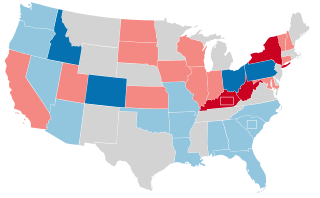
The 1956 United States Senate elections were elections for the United States Senate that coincided with the re-election of President Dwight D. Eisenhower. The 32 seats of Class 3 were contested in regular elections, and three special elections were held to fill vacancies. Although Democrats gained two seats in regular elections, the Republicans gained two seats in special elections, leaving the party balance of the chamber unchanged.

The 1954 United States Senate elections was a midterm election in the first term of Dwight D. Eisenhower's presidency. The 32 Senate seats of Class 2 were contested in regular elections, and six special elections were held to fill vacancies. Eisenhower's Republican party lost a net of two seats to the Democratic opposition. This small change was just enough to give Democrats control of the chamber with the support of an Independent who agreed to caucus with them, he later officially joined the party in April 1955.

The 1996 South Carolina United States Senate election was held on November 5, 1996 to select the U.S. Senator from the state of South Carolina. Popular incumbent Republican Senator Strom Thurmond, won re-election against Democratic challenger Elliott Springs Close for a seventh full term in office. The margin, however, was one of the closest in Thurmond’s 48-year Senate career. At the age of 93 years, 11 months and 3 days, Thurmond became the oldest person ever to be re-elected to the United States Senate. He eventually served out the entirety of what would be his final term and left the Senate on January 3, 2003, at age 100 years and 29 days.

The 1966 South Carolina United States Senate special election was held on November 8, 1966 to select the U.S. Senator from the state of South Carolina. The election resulted from the death of Senator Olin D. Johnston in 1965. Then Governor Donald S. Russell entered in a prearranged agreement with Lieutenant Governor Robert Evander McNair in which Russell would resign his post so that he could be appointed Senator. However, former Governor Fritz Hollings won the Democratic primary election and went on to beat Republican state senator Marshall Parker in the general election to win his right to fill the remaining two years of the unexpired term.

The 1998 United States Senate election in South Carolina was held November 3, 1998. Incumbent Senator Fritz Hollings won reelection to his seventh term. As of 2023, this is the last time that a Democrat has won a U.S. Senate election in South Carolina. This is also the last time the Democratic nominee for this Senate seat was a white man, as in future elections Democrats would either nominate a woman and/or a person of color.
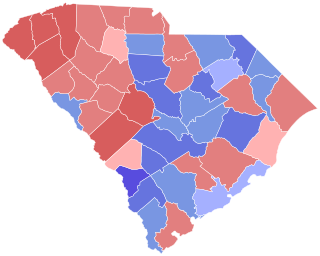
The 2004 United States Senate election in South Carolina was held on November 2, 2004. Longtime incumbent Democratic U.S. Senator Fritz Hollings retired, and Republican U.S. Representative Jim DeMint won the open seat. DeMint was the first Republican to hold this Senate seat since 1879, and the first Republican to ever be popularly elected to the seat.
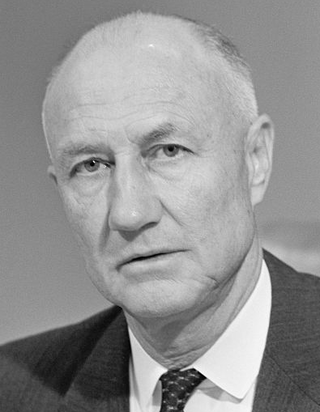
The 1966 South Carolina United States Senate election was held on November 8, 1966 to select the U.S. Senator from the state of South Carolina simultaneously with the special election to fill out the remainder of Olin D. Johnston's term.

The 1968 South Carolina United States Senate election was held on November 5, 1968, to select the U.S. Senator from the state of South Carolina. Incumbent Democratic Senator Fritz Hollings easily defeated Republican state senator Marshall Parker in a rematch of the election two years earlier to win his second,, term.

The 1986 South Carolina United States Senate election was held on November 4, 1986 to select the U.S. Senator from the state of South Carolina. Popular incumbent Democratic Senator Fritz Hollings easily defeated Republican challenger Henry McMaster to win his fifth term. This is also the last US Senate election in South Carolina where the Democrat won with a double-digit margin. McMaster would much later be elected Governor in 2018

The 1962 South Carolina United States Senate election was held on November 6, 1962 to select the U.S. Senator from the state of South Carolina. Incumbent Democratic Senator Olin D. Johnston defeated Governor Fritz Hollings in the Democratic primary and Republican W. D. Workman, Jr. in the general election.
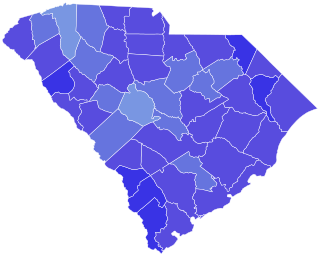
The 1974 South Carolina United States Senate election was held on November 5, 1974 to select the U.S. Senator from the state of South Carolina. Incumbent Democratic Senator Fritz Hollings easily defeated Republican challenger Gwen Bush to win his third term.























